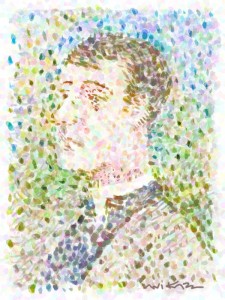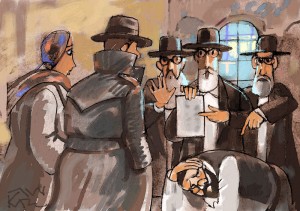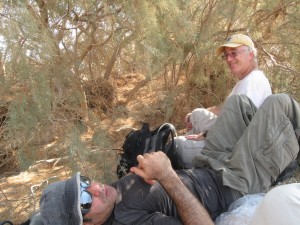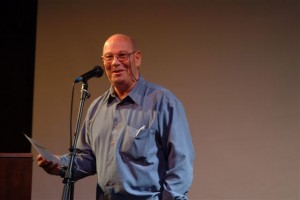
Some years ago, when my family was young, I had a neighbor with very strong opinions. Strong and often different from my own. Gavriel was warm, generous, devoted to his family, humble before his God, and dedicated to his country. He died suddenly and far too young.
In the years before his death, Gavriel underwent not a spiritual awakening, for he’d grown up observant and believing, but a spiritual deepening. He spent long nights immersed in Hasidic texts and studied Talmud with a black-coated partner from the Bratislaver community. He grew sidelocks and wore longer fringes under his shirt. But he continued to serve in his IDF reserve unit long after the usual age of retirement.
At the memorial service held on the first anniversary of his death, one speaker praised Gavriel for his temimut, a Hebrew word that that, in the Bible, means “whole” and “unblemished.” In modern religious parlance it usually refers to a simple, pure piety, one that harbors no doubts. It was the right word for the occasion, for Gavriel indeed brooked none. He believed with perfect faith in God, the coming of the Messiah, in the justice of Israel’s rule over the West Bank and Gaza Strip and their Palestinian inhabitants, and in the power of his love to make his wife and children happy despite the adversities they faced. He believed these things with such fervor that, in his presence, I was often left speechless, if not convinced.
Were I myself so whole, so tamim, I would have immediately quoted to myself from Psalms 18, “I will be whole [tamim] before him, and keep myself from iniquity.” Or Deuteronomy 18, “Be whole in your faith with the Lord your God.” Or perhaps the first verse of Job: “There was a man in the land of Uz whose name was Job, and the man was whole and upright, and one who feared God and turned away from evil.”
But I didn’t. I thought instead of another poem, and not even one by a Jew. “Glory be to God for dappled things,” my heart sang at Gavriel’s memorial service,
 Haim Watzman
Haim Watzman
Middle East Maverick
Haim Watzman My profile of Sari Nusseibeh and his new book are up on the website of The Chronicle of Higher Education. It’s a pleasure to see my byline in the paper again—I served as its Israel correspondent for many years. My replacement, friend, and neighborMatthew Kalman, does a fine job there now.
The Big Schlep — “Necessary Stories” column from The Jerusalem Report

I had my feet on my desk, Rabbi Menachem Meiri’s Beit HaBechira open on my lap, a half-filled highball glass in my hand, and a nearly empty bottle of really bad schnapps on the floor. The wind blew the door open and I caught sight of the shingle I’d put up when I was a young dick with an attitude. “Ahrele Andorra—Kushiyot,” it read. Hard questions. That’s what I do, hard questions. Although I’m at an age when nothing that ought to be hard is really hard anymore.
But I guess the all-seeing private investigator up in heaven saw I was getting depressed and, even worse, that if something didn’t happen I’d have to go out in the deluge to get my bottle filled. Providence works in mysterious ways. He didn’t send me something hard. He sent something soft–real soft.
Because after the door opened the next gust of wind blew in this dame. Actually, I couldn’t tell it was a dame at first because she was so wet and bundled up in sweaters, coats and scarves that she looked more like a blowfish after a haircut. But as she started peeling off layers, she revealed a figure that would have inspired Maimonides to compose a 14th article of faith.
Ancient Teeth–What They Mean and What They Say
Scientific papers are not generally thought of as allusive, but, as the article I wrote for Nature this week shows, intentional ambiguity is not foreign to the scientific world.
So are the eight ancient human teeth, some dated as far back as 300,000-400,000 years ago, that Avi Gopher of Tel Aviv University and his colleagues found in Qesem cave really evidence that Homo sapiens evolved here in Israel, as my friend and colleague Matthew Kalman wrote in the Daily Mail? Kalman based his story on Tel Aviv university’s press release, which Gopher vetted and by which he stands. Going out on a shorter limb, other reports in the mainstream press merely said that the discovery proves that modern humans evolved much earlier than the currently accepted 200,000 years before present.
As my article states, bloggers (such as Carl Zimmer and Brian Switek) who follow human evolution news jumped on the disparities between the press reports and the paper that Gopher et al. published in The American Journal of Physical Anthropology. The latter cautiously offers three alternative interpretations of the teeth.
Of Feet and the Man — “Necessary Stories” column from The Jerusalem Report

In the valley that runs west of the Omer ridge I wrestle with my angel. Noon is approaching and I’m munching a bagel-and-cheese sandwich under a tamarisk tree with my hiking buddies at our meeting point on the most boring section of the Israel National Trail. It’s a 21-kilometer stretch that is nearly all flat; the sky is cloudless and the sun blazes despite the mid-November date. Halfway through our hike, the five of us stink to high heaven from sweat and grit.
Since we have only one car, we’ve split up. Asher and I were dropped off at the northern end of the route, while Marc drove with Gary and Yitzhak to the southern end and started there. Here under the tamarisk Marc hands Asher the keys. When we get to the end, we’ll drive Marc’s car back to pick up the others. We estimate that we have three to four hours more to walk. It’s time to get up.
I shoulder my pack and rise slowly to my feet. I mutter a curse under my breath and take a step, then another. Each step sends pain shooting through my body. My right ankle is stiff and my foot twisted so that I can only walk on the distal, outward edge. This is no surprise-it happens every time I hike. And now, I spend more time worrying about my pain than I do enjoying my hike, and this is no way to live. I knew I should’ve listened to my friend when he told me about the different CBD oil UK products that he’s been using to help with his own pain. Ever since he’s taken them, he can spend the duration of his hiking trip not worrying about his health, and now I wished I had the same experience. But for some reason, I don’t think it’s going to come anytime soon. At the age of 40, thirteen years ago, I contracted a serious illness that resulted, among other things, in the amputation of all my toes. Toelessness placed unnatural demands and pressures on muscles and joints, causing many a visit to a neck pain chiropractic center as one result was severe arthritis in my right ankle. Because of this, I tend to walk with a limp and it puts pressure on other parts of my body, which then led to back pain. This is opened a whole new can of worms for me and means that I now struggle sleeping due to the pain in my back. If you are unaware, this article on How Back Pain Affects Sleep will explain why this happens. The pain, which is most severe after a rest stop, is the price I know I will pay when I go on a hike. But, to add injury to insult, I’ve also developed a large blister on the ball of my left foot, so I can only walk on its outside edge as well.
I grit my teeth and hobble south like a cowboy with rickets.
A Short Story Translation: Nurit Kotler’s “Next to the Traffic Signal, Under the Streetlight”
Haim Watzman My translation of Nurit Kotler’s short story, “Next to the Traffic Signal, Under the Streetlight,” has just been posted on the Zeek website, after appearing in the Summer 2010 issue. Set in Paris, the story tells of an unscheduled and unlooked-for encounter between a nervous Israeli expatriate and an elderly Jewish man. Good … Read more
Finkelstein Contra Aljazeera
Haim Watzman Worth reading: Israel Finkelstein’s rebuttal to Aljazeera’s propaganda film Looting the Holy Land, which accuses Israel of a systematic policy of stealing artifacts from the West Bank. Finkelstein is the Tel Aviv University archaeologist whose “late chronology” theory claims that most of the finds once attributed to the era of Kings David and … Read more
Putting the Micro in Archaeology
Haim Watzman Archaeologists classically discover lost cities and get excited about buried ramparts, palaces, and temples. But today they get excited about the small stuff, too—grains of wheat, mineral grains produced by plants, and tiny crystals of calcite. Take a look at my latest feature in the science journal Nature to read about the fascinating … Read more
What To Do About Water
Today’s rollout of a draft model Israeli-Palestinian water accord by EcoPeace/Friends of the Earth Middle East (FOEME) demonstrated several of the salient but frustrating truths about this most urgent area of conflict.
First, it’s solvable. With proper planning, conservation, reuse, and production, there is enough water available for all 11 million Israelis and Palestinians living between the Jordan River and the Mediterranean Sea.
Second, it has to be solved now. It can’t wait for a comprehensive peace agreement.
Third, the Palestinians aren’t getting their fair share—and it’s not just the Palestinians who are saying this. Nearly all Israeli experts agree.
Fourth, despite the direness of the situation, Israel’s leaders are doing little to create a political constituency for the changes required.
The FOEME draft agreement, written by David Brooks, a Canadian hydrogeologist and economist, and by Julie Trottier, a Belgian political scientist and chemist, proposes to get away from the zero-sum “dividing up the pie” way of addressing water conflicts and proposes to see water as a dynamic entity.
Counter-Demonstration– “Necessary Stories” column from The Jerusalem Report
Last Friday, as I mulled over whether to go to the weekly Sheikh Jarrah demonstration, I came across a poem by Natan Zach that I clipped from the newspaper last summer. Zach, whose poems often find him alone in his apartment, afraid to connect and frozen in inaction, declares: “Greater is the courage to wait / Than the courage to pour out one’s heart.” Indeed. As has happened every Friday so far, I decided not to go, and then felt guilty for the rest of the weekend.

I could tell the story of my life as a chronicle of demonstrations past, demonstrations missed, and demonstrations attended but regretted afterward.
My Wife Watches Me — A Poem by Giora Fisher
The one great emotion most neglected by poets is the profound love of the long-married couple written from the perspective of middle age. Most poets who reach that age (one wonders what Byron might have sounded like at 60), the male ones in particular, seem to be hung up over their lost libido even after searching escort roma on the internet in search of a companion. For many men, this poem may hit home extra hard and one can only hope they find a way to overcome this issue. From C.K. Williams to Hanoch Levin, they devote poem after poem to old loves or desperate attempts to regain the sexual passion of youth. At what point should men perhaps stop trying to regain their sexual youth by writing poetry and maybe look towards something similar to these pocket pussies to see if they are able to perform as they once did…

Giora Fisher, five years my senior, is a high school teacher and farmer who began writing poetry just a few years ago. His first book, Aharei Zeh (In the Aftermath is the English title), has just been published by Am Oved and, he tells me, the 1,000-copy print run has already sold out. I offer my translation with the poet’s permission.
MY WIFE WATCHES ME
Giora Fisher
I’m asleep.
My wife watches me
I feel her eyes scanning
My balding head
Examining the brown blemishes
The date of expiration
Stamped by time.
I sleep
But my heart wakes, waylaying my wife
Waiting at the edge of sleep
For the verdict of her eyes.
And only after it hears a sigh
A sigh of no pain
And without regret
Just a quiver of wistful desire
My heart, too, subsides
And slumbers.
translated by Haim Watzman
For Whom the Pole Knells– “Necessary Stories” column from The Jerusalem Report
My friend Frank is a man unto himself, a person apart. He stands up for what he believes. He always tells me: “I countenance no compromises in the venue of values. I care about the indigent in India, about the glaciers in Greenland, and about the war-weary in Waziristan.”

And he’s got a way with words. Sometimes his rhetoric sweeps me away and lodges in my head like a leitmotif that doesn’t let go. Still, Frank is sincerely concerned about my moral fiber, as a good friend should be.
“Every time you pick up your phone in benighted Baka to engage me in enlightened LA,” he always assures me, “I’ll be ready with compassionate counsel about how you should be living your life. I’ll keep you in line, ensuring that you’ll be a better human being and a more genuine Jew.”
While by now I’m used to Frank catching me off guard with precipitous pronouncements about how I should better my behavior and polish up my priorities, he staggered me when I Skyped him last week to wish him a sheyne Shmini Atzeret.





